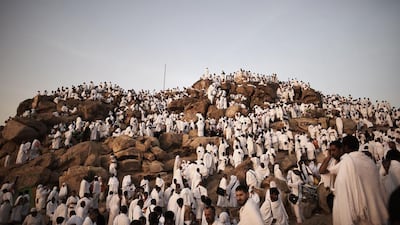MOUNT ARAFAT, Saudi Arabia // Tears flowed and prayers filled the air as Haj reached its peak on Friday on a vast plain in western Saudi Arabia.
“I am now a newborn baby and I don’t have any sin,” said Taofik Odunewu, from Nigeria, standing at the foot of Mount Arafat, tears streaming down his face.
Mr Odunewu was one of the nearly two million people who took part in this year’s pilgrimage.
“I pray for prosperity, long life and ... I pray for my country,” he said. “I’m very blessed to be part of this occasion. I don’t think I will go back to the sinful way.”
Hundreds of thousands of pilgrims arrived at the Arafat plain on Friday carrying suitcases and other luggage among thousands of white tents which stood ready to accommodate the multitude.
From early morning, pilgrims crowded onto the slippery, rocky hill also known as Mount of Mercy, where the Prophet Mohammed made his final sermon 14 centuries ago.
The pilgrims’ attire turned the hill white in colour, and they carried umbrellas as shields against the sun.
Male pilgrims dress in white ihram to symbolise a state of purity, which also emphasises their unity regardless of social status or nationality.
Some pilgrims sat alone on rocks, praying silently, as others gathered in groups, their voices in a loud appeal to God.
Egyptian pilgrim Mohammed Ahmed, 53, sat with his wife under a yellow rubbish bag they set up as a makeshift tent.
He said they were praying for “the victory of Muslims, those who are weak, oppressed, and jailed ... all over the world”.
The Saudi interior minister Prince Mohammed bin Nayef said Haj had attracted almost 1.4 million foreign pilgrims from 163 nations.
Saudi media report that several hundred thousand Saudis are also participating.
Security forces were deployed en masse across Arafat plain to organise the wave of humanity.
“This way, haji. Don’t stop here. You’re blocking the way,” security men said through loudspeakers.
“Sometimes we have difficulties understanding each others’ languages, and mostly the elderly can’t understand what we are saying,” said Ali Al Shemmari, a soldier stationed at the hill.
“The pilgrims believe that they should climb up, although this is not necessary ... But things are going well.”
The number of pilgrims seemed fewer than past years following a crackdown on pilgrims without permits. More than 145,000 pilgrims were turned away.
Permits are a way of ensuring that such a large gathering with massive logistical challenges proceeds smoothly.
This year’s Haj comes with Saudi Arabia and four other Arab nations joining Washington in airstrikes against ISIL militants who have committed a spate of atrocities in Syrian and Iraqi territory they seized.
Saudi authorities are also striving to protect pilgrims from two deadly viruses, Ebola and Mers.
No such cases have been recorded among the Haj visitors, officials say.
Mr Odunewu and other pilgrims from Nigeria were permitted to enter Saudi Arabia for Haj, despite eight Ebola deaths in their country, but three West African states hardest hit by Ebola have not been allowed Haj visas.
Pilgrims stayed at Mount Arafat until sunset when they went to Muzdalifah, where they gathered pebbles for the symbolic “stoning of the devil” on Saturday.
* Agence France-Presse

